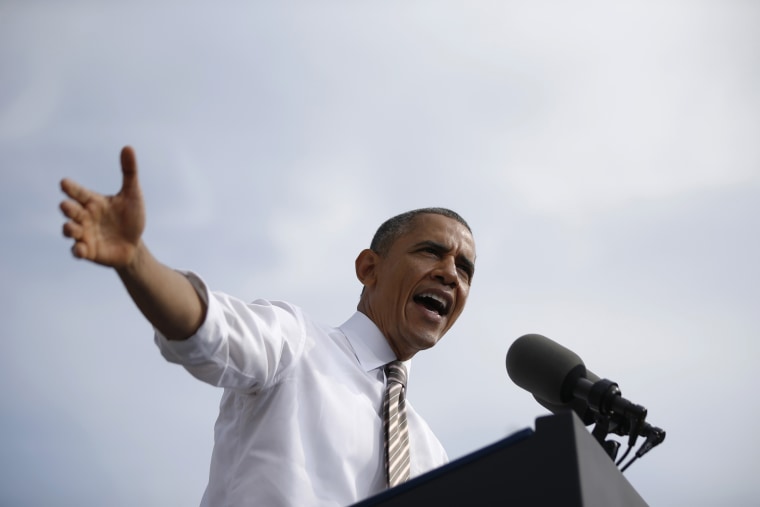Updated Sunday 10:30 a.m.
Congress’ political brinkmanship over the government shutdown may unfold as merely Act One in a greater saga, leaving the potential for a bad situation to warp into something much, much worse.
With less than two weeks to raise the debt ceiling or risk the U.S. defaulting on its legal obligations, Treasury Secretary Jack Lew took to Sunday’s morning shows to sound the alarm.
On Meet the Press, Lew explained that the U.S. hit the debt limit in May, and that he has already exhausted all of the “extraordinary measures” at his disposal to fulfill fiscal obligations.
On October 17, Lew said, America would be left with only $30 billion of what he called “cash on hand.”
Lew also said that there is nothing preventing Congress from voting on a debt ceiling increase right now, echoing what President Obama told the Associated Press in an interview published Saturday.
The Treasury Secretary also said that Obama is willing to negotiate on fiscal policy issues outside the context of an impending economic catastrophe, which could open up opportunities for Republicans in future budget talks.
The Treasury Department released a report Thursday that said that among possible results of a default, “credit markets could freeze, the value of the dollar could plummet, and U.S. interest rates could skyrocket, potentially resulting in a financial crisis and recession that could echo the events of 2008 or worse.”
The report also warned that a prolonged debate over raising the debt limit could hurt financial markets, which would spell even deeper trouble for Americans already struggling to make ends meet.
President Obama delivered a similar message this week when he spent all of Wednesday courting the influence of Big Business. The president met with the heads of several top Wall Street firms to reiterate the detrimental effects of a government shutdown and the perils of uncertainty the debt ceiling debate has on the markets. Speaking to CNBC that day, Obama said, “CEOs around the country can have an influence,” a message that playing too many games could cost the GOP support from its corporate benefactors.
With less than two weeks until a default and negotiations over funding the government and bringing back the some 800,000 furloughed federal workers at an impasse, some Republican leaders have been advocating to merge the two efforts. The deal that is reportedly forming would trade an increase in the debt limit for a broader set of budget-related demands and concessions to Republicans who want to dismantle the Affordable Care Act.
In the shutdown debate, House Republicans have already passed eight piecemeal measures picking and choosing which government programs and agencies to reopen, with as many as eight more mini-spending bills on the way. The White House and Senate Majority Leader Harry Reid have said they will not negotiate with Republicans over the shutdown and have repeatedly rejected the piecemeal funding bills that the House has put forward.
The New York Times reported Friday that Speaker of the House John Boehner had privately vowed to avoid a U.S. default. In an interview with the Associated Press, Obama suggested that Boehner has not done enough to avoid this crisis. “I’m pretty willing to bet that there are enough votes in the House of Representatives right now to make sure that the United States doesn’t end up being a deadbeat. The only thing that’s preventing that from happening is Speaker Boehner calling the vote,” he said.
When Republican lawmakers make their own appearances on the Sunday shows, they will continue to push out the message that they want only to negotiate and reach a compromise, first on the funding bill and then on the debt ceiling. While they’ve already failed to stop Obamacare – the Supreme Court has already upheld the Affordable Care Act, and the health care exchanges designed to increase access to insurance for millions of Americans opened on October 1 – the sequester is still intact, and the looming default threat could open an opportunity to fight for even greater cuts to federal spending than the GOP has already won.
In his AP interview President Obama indicated that he is willing to negotiate with House Republicans in order to keep the U.S. economy functioning, but that he would not let a small faction of one party hold the government hostage. “What I’ve said to [Boehner] is we are happy to negotiate on anything,” Obama said. “We are happy to talk about the health care law, we’re happy to talk about the budget, we’re happy to talk about deficit reduction, we’re happy to talk about investments.”
“But what we can’t do,” Obama reiterated, “is keep engaging in this sort of brinksmanship where a small faction of the Republican Party ends up forcing them into brinksmanship to see if they can somehow get more from negotiations by threatening to shut down the government or threatening America not paying its bills.”
On Friday, at the end of the first week of the shutdown, Democrats claimed that some Republican House members have said they would support a continuing resolution that would provide funding for the government without concessions to the most conservative members of the House GOP and tried to pass the Senate’s bill. Despite those claims, no Republicans broke ranks to vote with the Democrats.
